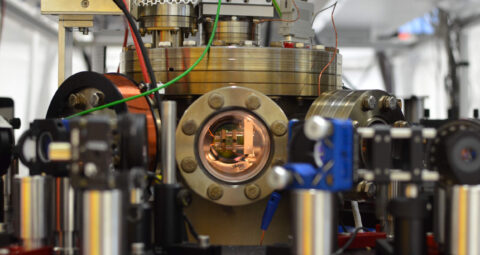Researchers build the world’s smallest heat engine
An engine made of a single atom
Researchers at FAU, in collaboration with colleagues at the universities of Mainz and Kassel, have constructed the world’s smallest engine. The tiny machine consists of just a single atom and is able to convert heat into kinetic energy effectively. The results of the physicists‘ research have recently been published in the journal Science.
Heat engines have played a key role in our society since the industrial revolution. They convert heat into kinetic energy and can be used to power steam engines, cars and other machines. They work according to a simple principle. An air-tight chamber is heated and then cooled again, causing the gas inside to expand and contract. The changes in pressure move a piston back and forth, which moves a flywheel via a crankshaft.
A team of researchers led by Prof Dr. Ferdinand Schmidt-Kaler from the University of Mainz, Prof. Dr. Kilian Singer from the University of Kassel and Prof. Dr. Eric Lutz from FAU have applied this principle to a single electrically charged calcium atom. The particle is held in the air by metal rods that are just a few millimetres long. An electrical noise signal causes the atom to oscillate strongly, making it heat up. It is then cooled down again by slowing down its movements using a laser beam. Heating and cooling the atom causes it to oscillate – a movement that is comparable to the back-and-forth motion of the pistons in a conventional engine. Each heating and cooling cycle increases the atom’s oscillation radius, causing it to store energy.
The physicists took many series of measurements which enabled them to describe the engine’s thermodynamic behaviour exactly. The single atom engine has a power of 10-22 watts and an efficiency of 0.3 percent. ‚We could also consider reversing the cycle in the single atom engine, turning it into a single atom refrigerator,‘ says Prof. Dr. Eric Lutz. ‚This would be a useful development for technologies that are focusing more and more on miniaturisation.‘
The development of nanomotors is particularly important for basic research as it allows researchers to learn more about the thermodynamics of individual particles – a key area of current research. In the future the team plans to reduce the operating temperature further and to investigate quantum thermodynamic effects. Theoretical work suggests that the heat engine’s power could be increased by coupling it to a quantum bath. This is just one of many possible areas that could be explored beyond the traditional scope of thermodynamics which could lead to new approaches for building new types of engine.
The project is part of the „Single ion heat engine“ project funded through a research grant of the German Research Foundation and received further funding by the Volkswagen Foundation.
DOI: 10.1126/science.aad6320
Further Information:
Prof. Dr. Eric Lutz
Phone: +49 9131 8528459
eric.lutz@fau.de
